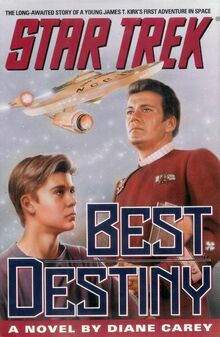
Synopsis:
In the past, some forty-five years earlier, the reader is introduced to a young Jimmy Kirk. At 16 years old, he embodies every parent's worst fears: he is brash, rebellious, impulsive, cocky, and reckless. He is first seen leading a group of similarly rebellious (and criminal) youths on a barely-considered scheme to "escape" from Iowa, sign onto an ocean-going freight vessel as underage deckhands (itself illegal), and make their fortune somewhere in South America. Even at this young age, it is clear that Jimmy is a leader, but he is completely directionless. His father's long absences on Starfleet assignments and his own experiences on Tarsus IV have made him angry and violent, as well as impatient for the right to make his own decisions and live his own life.
It is clear that Jimmy's mother, Winona, can no longer handle him, but George's continuing commitments to Starfleet will inevitably keep him in deep space. Fearing that his son is on the road toward becoming a career criminal and ne'er-do-well, George briefly considers resigning from Starfleet until Winona suggests that he call in some old favors and take Jimmy into space with him.
Warming to the idea, George contacts his old friend, Robert April, and arranges to take Jimmy into space on a routine assignment to the planet Faramond. A new archaeological dig is about to get under way there, and April has been asked to break ground. More than that, April has arranged not only to take George and Jimmy with him to Faramond, but to do so aboard the still cutting-edge U.S.S. Enterprise. Although Jimmy displays his usual rudeness and lack of respect for authority on the trip up from the Earth's surface, April displays an uncommon patience and understanding for his godson, even as George experiences continuing frustration. Nevertheless, even Jimmy is impressed by his first view of Enterprise.
Also, I remember at the time:
"The filmmakers sought inspiration from novels such as Prime Directive, Spock's World, and Best Destiny to fill in gaps unexplained by canon; Best Destiny particularly explores Kirk's childhood and names his parents."

At first, I didn't really understand what Orci and Kurtzman were trying to do with Star Trek, with it's Nokia product-placements, and seemingly un-Roddenbury-like romanticism of Kirk's life.
But, I think I understand their direction better now: They are trying to bring the Federation back to being the smaller, most intimate alliance seen in TOS, TAS, late ENT and the early books (like the 1989 reference work 'Worlds of the Federation', and Franz Joseph's ship designs from the 1973 'Star Trek Blueprints') - as opposed to this more mono-cultural post-First Contact Federation that stretches 8,000 light years, where travel between worlds has become mundane. Books like 'Cadet Kirk', 'Spock's World', 'Best Destiny', etc, seem to have heavily influenced it.
And I think this is a very positive move. Star Trek was starting to become too ossified; the Federation was like a federal nation state during the Dominion War - the feel of an entity with diverse alien member worlds was missing - early Star Trek portrays the Federation more like a bunch of diverse rocky spheres hanging lonely in space, separated by the vast void - only marginally allied (i.e. Journey to Babel), each with exotic cultures (i.e. The Cloud Minders), like distant port cities in the European age of empire.
I find that much more compelling, although it took a while to come to terms with it, after years of thinking of the Federation as an entity full of thousands of colonies, outposts, border stations, fleets of ships, etc. Do others like this direction too?






